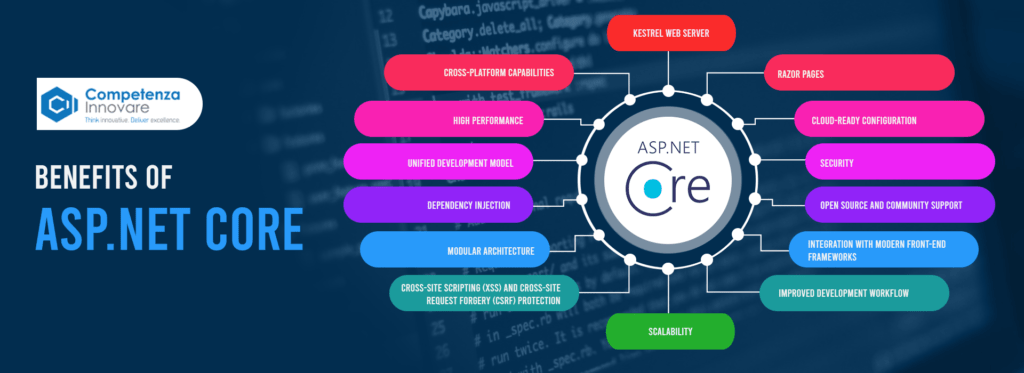A strong, cross platform, high performance framework for creating contemporary, cloud-based , and internet connected apps is ASP.NET core. It is an open-source, redesigned version of classic ASP.NET framework created by Microsoft that is well liked by developers due to its many advantages. The main benefits of utilizing ASP.NET Core will be covered in detail in this material.
Top Benefits of ASP.NET Core for Modern Web Development

1. Cross-Platform Capabilities
Cross-Platform capabilities is one of ASP.NET core’s biggest benefits. Windows, Linux and macOS can all run ASP.NET Core, in comparison to the previous ASP.NET framework, which was only compatible with windows. Due to its flexibility, Asp net developers can develop and deploy applications on various platforms, thereby rendering it an ideal choice for a range of development environments and ensures more compatibility and reach.
2. High Performance
Application development depends heavily on performance, and ASP.NET Core works exceptionally well in this regard. Its outstanding efficiency is due in part to its lightweight and modular structure. Based on benchmarks, ASP.NET Core beats many of its rivals and is one of the most rapid web frameworks available. This speed may be due in large part to the Just-In-Time (JIT) compilation method, that allows code to be converted straight to machine code, as well as the efficient handling of asynchronous programming and optimized memory use.
3. Unified Development Model
A single method of development for creating web UI and web APIs is provided by ASP.NET Core. Due to this unification, developers are able to use a single framework to create both types of apps, which simplifies the development process.With its support of Web API and MVC (Model-View-Controller) construction, developers can employ a consistent programming approach to conduct scalable and trustworthy web applications and services.
4. Dependency Injection
ASP.NET Core’s Dependency Injection (DI) is an essential component. DI promotes loose coupling and enhances application maintenance and testability. An integrated DI container for ASP.NET Core is used by default, but it can be changed to a different DI container if needed. With this flexibility, developers can develop more modular and maintainable apps and handle dependencies better.
5. Modular Architecture
Since ASP.NET Core is based on a modular design, developers can include just the parts that their applications actually require. Applications which are more modular are faster and leaner because of unnecessary libraries and components are not loaded. The framework lets developers add or remove features as required by using NuGet packages to manage dependencies. Updating applications with the newest features and security fixes is also made easier by this modular design.
6. Razor Pages
A new feature in ASP.NET Core that makes developing page-focused scenarios easier is called Razor pages. It provides a simple to use, intuitive page-centric programming model. Razor pages makes managing controllers and actions easy for developers by allowing them to make dynamic web pages with no programming expertise. Those who’re new to the framework or are developing smaller applications may find this feature especially useful.
7. Cloud-Ready Configuration
The structure of ASP.NET Core puts cloud applications into account. Building, installing and managing cloud-based applications are made easy by its built-in support for cloud deployment and setup. The framework gives permission to developers to handle settings in a flexible and cloud-friendly way by allowing configuration files such as appsettings.json and environment variables. ASP.NET Core is an excellent choice for cloud-native programming as it easily intefaces with popular cloud platforms like Microsoft Azure.
8. Security
Any application’s security must be its first priority, and ASP.NET Core offers a number of tools to make this simpler for developers to do. Built-in authentication and authorization components include Identity, which supports a variety of authentication methods such as cookies, JWT tokens, and third-party providers such as Google and Facebook. Additionally, by default ASP.NET Core supports HTTPS, which helps with the protection and security of data sent between server and client.
9. Open Source and Community Support
Microsoft supports ASP.NET Core, which is open source along with a strong developer community. Because it is open source it encourages cooperation, transparency and continuous improvement. Developers gain access to the most recent updates and features, can flag bugs and contribute to the framework. Due to the strong community support, developers can also access an array of resources like forums, tutorials, and documentation which helps in learning and troubleshooting.
10. Integration with Modern Front-End Frameworks
Modern front-end frameworks and technologies like Angular, React, and Vue.js can be easily integrated with ASP.NET. Due to this connection, developers may use the strength and flexibility of ASP.NET Core on the back end to make dynamic, rich online applications while utilizing their preferred front-end technologies. For a full-stack .NET development experience, the framework also supports WebAssembly via blazer, which allows developers to run .NET code directly in the browser.
11. Kestrel Web Server
Kestrel is a lightweight, high-performance web server which was made to support ASP.NET Core. Kestrel can be used either alone or in combination with a reverse proxy server such as Apache or Nginx. It is a great choice for giving ASP.NET Core applications because of its high performance and scalability, which ensures that the apps can effectively handle a large volume of requests.
12. Improved Development Workflow
With capabilities like .NET Core CLI (Command Line Interface), which enables developers to create, build and perform apps from the command line, ASP.NET Core simplifies the development workflow. Furthermore, it allows hot reload, which speeds up development by enabling developers to apply code changes without having to restart the application. In addition, ASP.NET Core provides a rich and efficient coding environment by integrating with popular development tools like Visual Studio and Visual Studio Code.
13. Cross-Site Scripting (XSS) and Cross-Site Request Forgery (CSRF) Protection
Built-in defense against widespread internet vulnerabilities like Cross-Site Scripting (XSS) and Cross-Site Request Forgery (CSRF) is offered by ASP.NET Core. In order to make sure that apps are secure from these types of assaults, it has features that remove user inputs and validate requests. Instead of needing complex custom code or third-party libraries, developers can relate trustworthy and safe applications with the support of this built-in security.
14. Scalability
Modern apps should be scalable, and ASP.NET Core is built to easily manage scenarios with heavy traffic. Applications can expand effectively thanks to its lightweight and adaptable architecture, effective memory management and Kestrel’s performance benefits. In addition, ASP.NET Core can be used in microservices architecture, increasing its scalability and as well as making it possible for developers to make expansive, dispersed systems.
Conclusion
With so many benefits, ASP.NET Core is a great option for present web development. Its high performance, flexible design, cross-platform compatibility, and broad security features offers a solid platform for developers with an extensive range of applications. ASP.NET core is an effective and adaptable framework for developers which stands out for its large community support, cloud readiness, and easy interaction with up-to-date front-end frameworks. The features and tools given up by ASP.NET core allow the development of effective, scalable and applications, despite the size of the system being built – small web apps or vast corporate systems.






